
English silver plated teapot with kangaroo crest, 19th century Elkington
'European and Australian Royal Mail Co.' antique English silver plated teapot with engraved acanthus decoration and kangaroo crest, by Elkington & Co. Of Birmingham, 19th century, 21 cm high

Antique Oak and Silver Ice Bucket with Kangaroo Decoration
An antique oak and silver plated ice bucket with white porcelain liner and kangaroo decoration, late 19th century, stamped 'Elkington, Sydney', 20 cm high overall
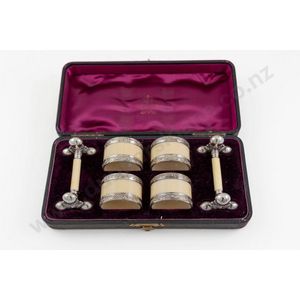
Victorian Silverplated & Ivory Napkin Rings and Knife Rests Set
Attractive cased set of Victorian silverplated & ivory napkin rings & knife rests by Elkington & Co, attractive cased set of Victorian silverplated & ivory napkin rings & knife rests by Elkington & Co
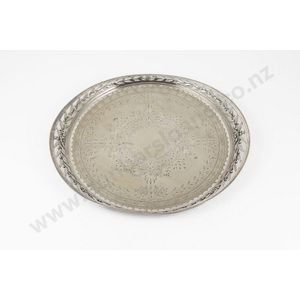
Elkington & Co Silverplated Drinks Tray with Leaf and Berry
An elegant Elkington & Co silverplated drinks tray, with pierced leaf and berry rim and engraved centre, 34.5 cm W
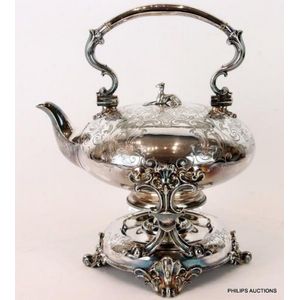
Victorian Electroplated Spirit Kettle on Stand, Elkington, 1858
A Victorian electroplated spirit kettle on stand, Elkington, marked E&Co crown within shield, with date letter for 1858 in the rococo style, the kettle of compressed circular form with swing handle, engraved with scrolls and floral garlands, a vacant…

Elkington Egyptian Revival Mirrored Centrepiece & Bowl, 1873
Elkington plate Egyptian revival mirrored centrepiece & bowl, comprising a large lozenge-shaped mirrored plateau and a raised bowl on stand with reclining sphinxes engraved with hieroglyphics on a pierced base with fanned leaves, asp snakes, and reeded…

Elkington & Co Silverplate Breakfast Tureen with Ivory Handle
Silverplate breakfast tureen, by Elkington and Co, swivelling lid with an ivory handle, width 33 cm height 22 cm

Victorian Silver Plate Claret Jug with Elkington & Co Mark
A Victorian silver plate mounted claret jug, Elkington & Co, circa 1890, the compressed ovoid body with etched vine and leaf decoration and an angular leaf capped handle, the collar decorated with applied floriate and mask head mounts, and surmounted by a…
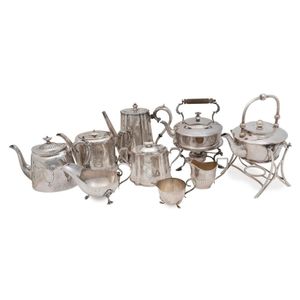
Mixed Silver Plate Tea Wares: Elkington, Walker & Hall (9 Pieces)
A mixed collection of silver plate tea wares including Elkington and Walker & Hall, comprising nine pieces, the largest spirit kettle 28 cm high
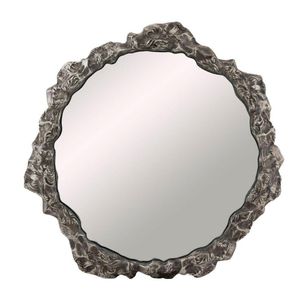
19th Century Elkington Silver Plated Centrepiece on Mirrored Stand
Elkington & Co. Antique English silver plated centrepiece on mirrored stand, 19th century, (2 items), 46 cm high, 40 cm wide
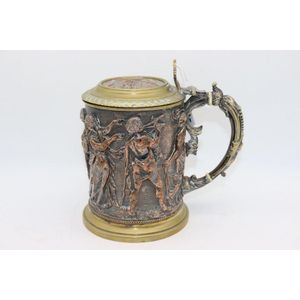
Late 19th Century Elkington & Co Silver Plated Tankard
Silver plated tankard, late 19th century. Elkington and Co, classical scene decoration. Height 19 cm
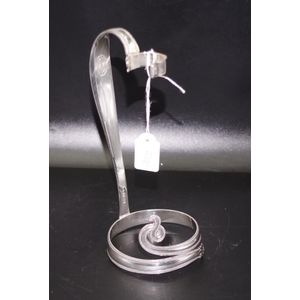
Elkington Wine Bottle Stand, 1864 Registration, Beaded Rims
Good Elkington silver plate wine bottle stand beaded rims, registration mark for 1864, height 20 cm.
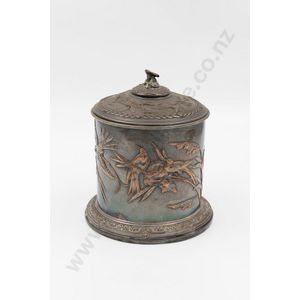
Elkington & Co Sheffield Plate Biscuit Barrel with Birds
19th century Elkington & Co Sheffield plate biscuit barrel cylindrical shape, hinged lid with floral finial, the body cast in low relief with birds and branches
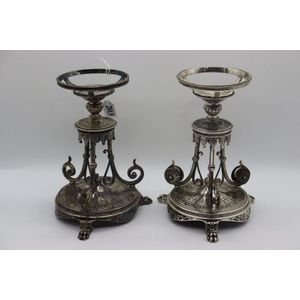
Victorian Elkington Silverplated Ornate Stands, A/F
Elkington and Co silverplated base stands, pair of Victorian stands with extensive ornate design in relief on lion clawed feet, A/F roundels absent to one stand
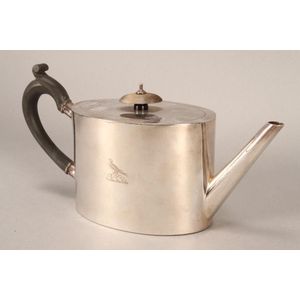
Elkington Silver Plate Teapot with Wooden Handle and Finial
English 19th century silver plate teapot, by Elkington, with wooden finial and handle on a tapering oval body, length 25 cm
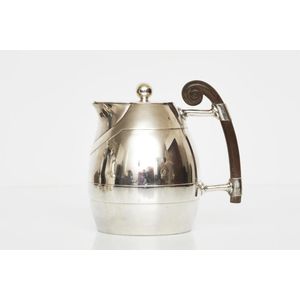
Dresser Silver Plate Water Jug with Wooden Handle
Christopher Dresser (British, 1834-1904) silver plate water jug, mark of Elkington & Co., c. 1890 shape 16594, Rd no. 22869, with wooden handle, retains silversmith's mark and numbered, height 16.5 cm. Provenance: Phillips, July 2001, lot 227. Private…
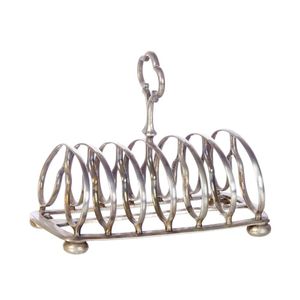
Elkington & Co Kangaroo Toast Rack
A Victorian silverplated toast rack by Elkington & Co, six divisions with quatrefoil handle on bun feet engraved with a kangaroo under a crown and 'A. P. Coy', height 14 cm, width 17 cm, depth 9.5 cm
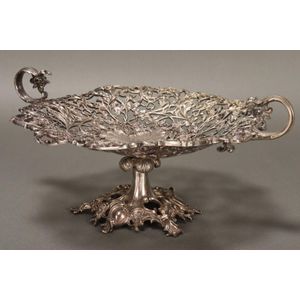
Elkington Silver Plate Twin Handled Tazza
Lovely Elkington silver plate twin handled tazza, the shallow top pierced with a scrolling decoration of flowers, foliage and acanthus, flanked by flower head handles, on a rococo base, height 13 cm
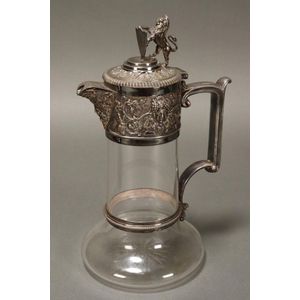
Elkington Silver Plate Ewer with Bacchus and Grapes Decoration
Lovely Elkington silver plate ewer, with lion shield thumb piece, the mounts decorated with bacchus and grapes, above a tapering body, height 27 cm
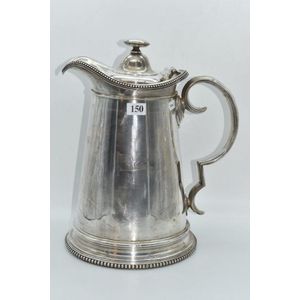
Engraved Armorial Elkington Silver Plate Jug
Large silver plate Elkington jug with engraved armorial
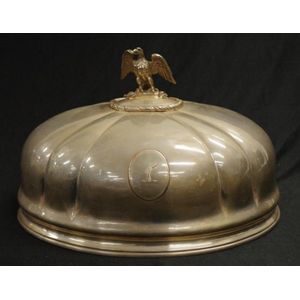
Victorian Elkington Silver Plate Meat Dome with Eagle Finial
Good Victorin Elkington silver plate meat dome marked to base, with decorative Eagle form finial and removable handle, crested insignia to both sides, length 38 cm.
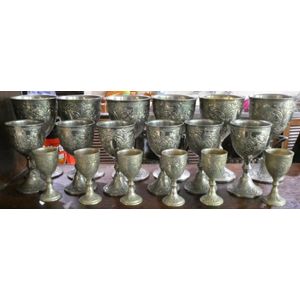
Elkington & Co Electroplated Goblet Suite (18 pieces)
19th century Elkington & Co suite electroplated goblets comprising six tall goblets with six smaller matching goblets and six liqueur goblets tallest measures 16 cm (18)
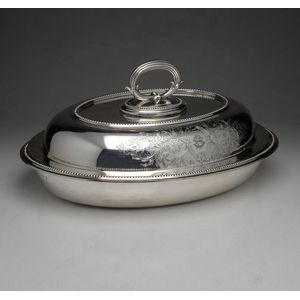
Victorian Monogrammed Silver Plate Serving Dishes
Pair of monogrammed Victorian silver plate serving dishes Elkington & Co 1872, length 30 cm

Victorian Elkington Kantharos with Bcyc Regatta 1884 Inscription
Victorian Elkington & Co Electrotype plated replica of a classical Roman Kantharos with inscription 'Bcyc Regatta 1884 won by Avoset' mid 19th century, high relief decorated with centaurs and cherubs, height 15 cm, inscription to inner rim
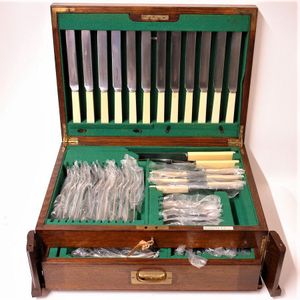
Elkington Dubarry Silver Cutlery Canteen with Oak Case
An early 20th century Elkington & Co. Ltd 12-person silver plate canteen of cutlery, in the Dubarry pattern, the quality oak canteen with fitted interior, the top layer above a single drawer, the lid holding the 12 table knives.
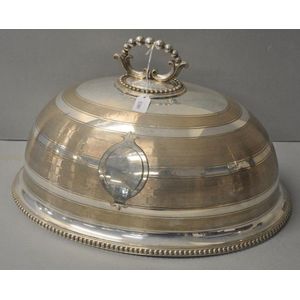
Victorian Elkington Silver Plated Meat Dome - 46cm Width
Large Victorian silver plated meat dome maker: Elkington, width 46 cm
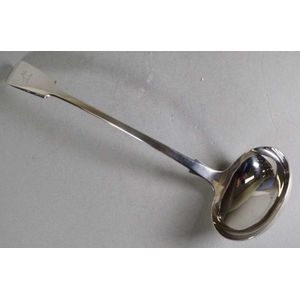
Victorian Elkington Soup Ladle with Armorial, 1878
Victorian Elkington silver plated soup ladle fiddle pattern with armorial, circa 1878, 34 cm long
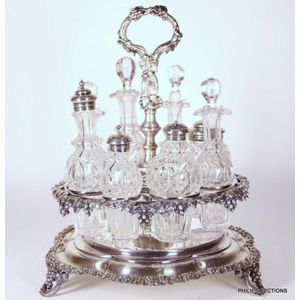
Victorian Silver Plate Revolving Eight-Bottle Cruet
A fine Victorian silver plate revolving Eight-Bottle cruet, 1859, maker's mark of Elkington & Co, the circular body raised on three vine leaf feet with an applied vine rim, frame and loop handle, supporting matching cut glass bottles for salt and pepper,…
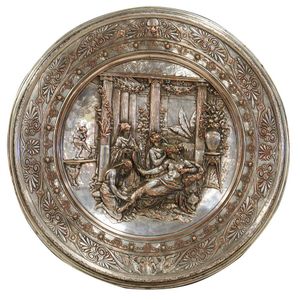
Elkington Silver Plate Classical Scene Plaque
An Elkington silver plate plaque, circa 19th century. Depicting a classical scene. 52 cm diameter
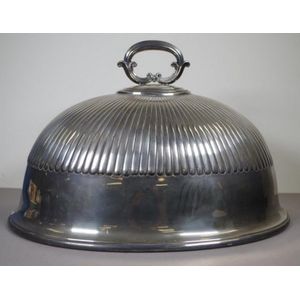
1888 Elkington & Co Silver Plated Meat Cover
Victorian Elkington & Co silver plated meat cover, with date letter 'C' for 1888, 45.5 cm wide
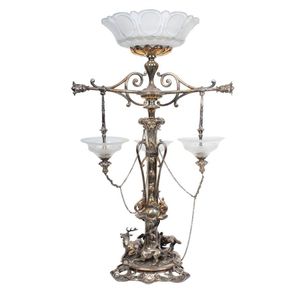
EPNS Elkington Scalloped Glass Centrepiece with Hunting Scene Engraving
Centrepiece, EPNS Elkington, 1850, scalloped edge cut glass top with three hanging bowls, piece mounted on an engraving, depicting two Wolves hunting a deer, height 70 cm
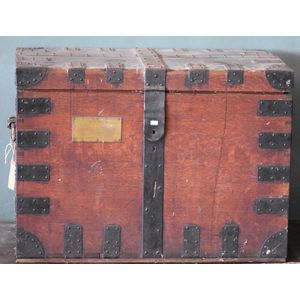
Elkington Plate Cutlery and Accessories Chest
A rare chest of Elkington plate cutlery and accessories, comprising: tray 1: 17 dinner knives, the steel blade marked 'Elkington & Co limited 73 Cheapside', 11 cheese knives, 12 dinner forks, 12 dessert forks, 12 tea spoons, 12 napking ring, 6 egg spoons,…
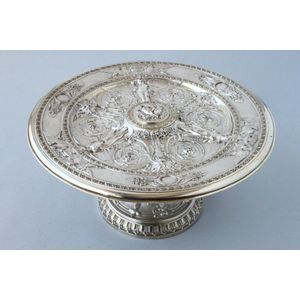
Victorian Elkington Silver Plate Tazza with Medusa and Cupids
Victorian Elkington silver plate tazza, c.1874, of circular form with central head of Medusa surrounded by cupids, and garlands, on a circular foot, height 11.5 cm
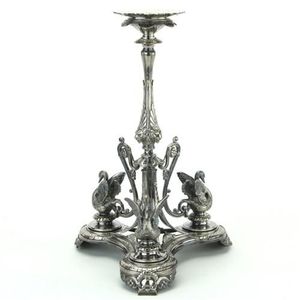
1883 Elkington Silver Plated Swan Centrepiece
Elkington & Co. Silver plated swan centrepiece with rococo influences, lion head motifs & shell form detail, dated 1883. Height 33 cm
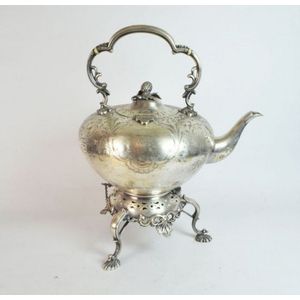
Victorian Rococo Spirit Kettle with Stand and Burner
A Victorian Elkington & Co, silver plated spirit kettle with burner and stand c.1860-1870, decorated in the rococo style Elkington marks to base height 38 cm
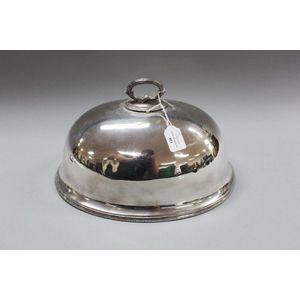
Elkington Knight Crested Tureen and Meat Dome
Antique Elkington beaded serving tureen and gadrooned meat dome, both nicely crested with a knight and a crowned phoenix marked to base, circa 1865-97, approx 40 cm wide and smaller (2)
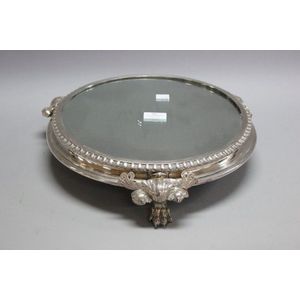
Antique Elkington & Co. Mirrored Table Plateau
Antique Elkington & Co. mirrored circular table plateau, marks to base, approx 39 cm dia
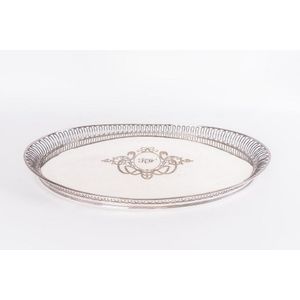
Elkington & Co Victorian Silver Plate Gallery Tray
A Victorian silver plate oval gallery tray by Elkington & Co, 1889, 63 x 41 cm
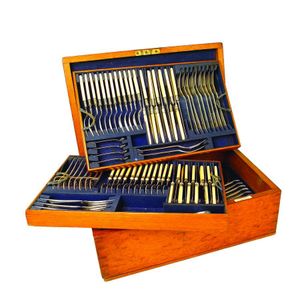
Elkington & Co. Silver Plated Cutlery Canteen with Ivory Handles
An oak cased canteen of Elkington & Co. silver plated cutlery, including ivory handled 12 place fruit and fish knives and forks, numerous other utensils and additional stainless steel bladed knives of matching bead edged pattern, housed in fitted…
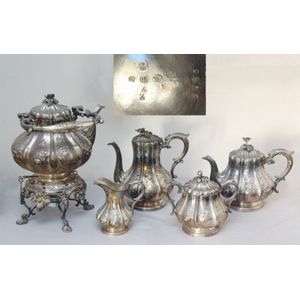
Victorian Elkington & Co Plated Tea & Coffee Service
A Victorian five piece plated Elkington & Co tea and coffee service consisting of a coffee pot, teapot, sugar basin, milk jug and tea kettle on stand with burner. Each piece has embossed floral and foliate decoration in baluster form.
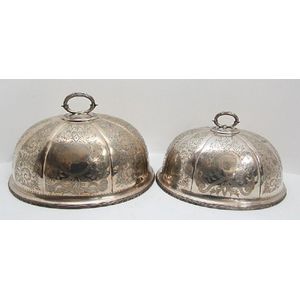
Graduating Silver Plated Meat Covers by Elkington & Co
Two Elkington & Co. silver plated graduating meat covers
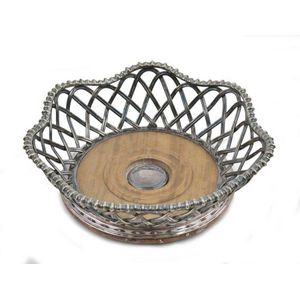
Sheffield Plate Bottle Coaster, 1853
A Sheffield plate bottle coaster, Elkington & Co. /, circa 1853, the latticed and lobed body joining to a circular wooden foot, 18 cm diameter
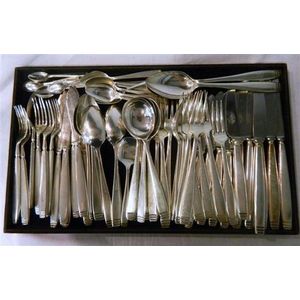
Elkington Silver-Plate Cutlery Set for Six with Serving Pieces
An Elkington silver-plate cutlery set for six, including fish cutlery and serving pieces. One entree knife deficient
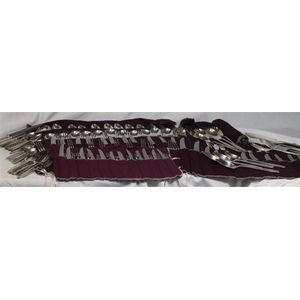
Elkington Silver-Plate Cutlery Set for Twelve - 174 Pieces
An Elkington silver-plate cutlery set for twelve. Twelve each soup spoons, meat knives and forks, dessert spoons, fish knives and forks, entree knives and forks, hors d'oeuvres knives and forks, teaspoons, coffee spoons, tablespoons, cake forks, one…
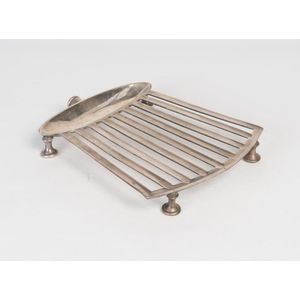
Sydney Elkington & Co. Silver Plated Drainage Tray
Elkington & Co., Sydney silver plated drainage tray. 4 cm high, 31 cm wide, 22.5 cm deep.
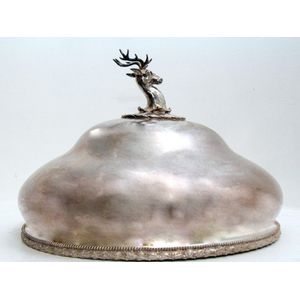
Elkington plated meat cover with deer head hand
Elkington & Co. plated meat cover with deer head hand. 37 cm high 555 wide
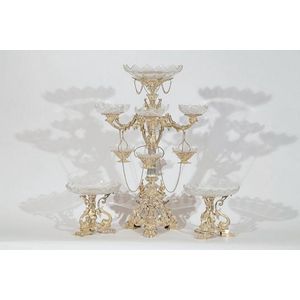
Elkington & Co Silver Plated Epergne with Cut Glass Bowl
Bishop Suter's epergne, a magnificent late 19th century silver plated epergne by Elkington & Co, the top with large engraved cut glass bowl, six smaller bowls beneath supported on stylised scroll arms with three bon-bon baskets hanging beneath, reeded…
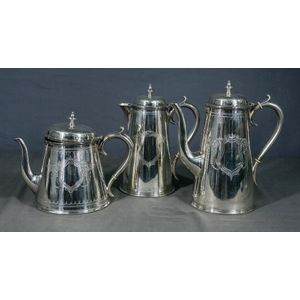
Elkington Silver Plated Tea & Coffee Set (3 pieces)
Edwardian three piece Elkington silver plated tea & coffee set. Teapot, coffee pot & hot water jug. Height 25 cm (coffee pot)
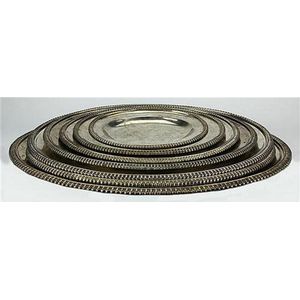
Graduated Elkington & Co Silver Plated Trays with Beaded Edging
Silver plated Elkington & Co graduated set of six trays with beaed edging. Condition good to fair, some wear to the plating. Length of largest 46 cm
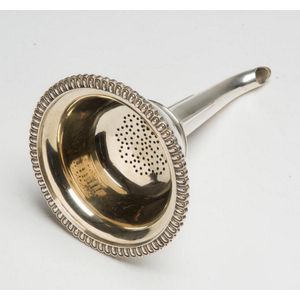
Victorian Elkington & Co Wine Funnel, 1853
A Victorian silver plate wine funnel by Elkington & Co, 1853
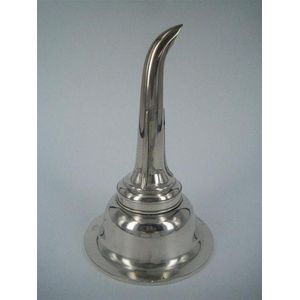
Victorian Wine Funnel with Gilt Interior & Engraved Initial
A Victorian silver-plate wine funnel with gilt interior, engraved with an initial; Elkington & Co., Birmingham c.1856. Height 14.5 cm
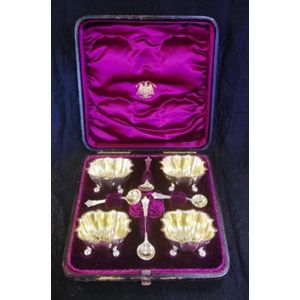
Elkington & Co Silver Plated Salt Cellars with Spoons & Box
Set of 4 Elkington & Co silver plated salt cellars, with gilt interior, each with a spoon, in presentation box
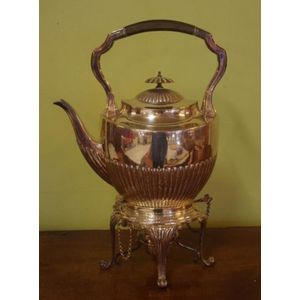
Antique Elkington & Co Silver Plated Spirit Kettle
Antique Elkington & Co silver plated spirit kettle, 34 cm high
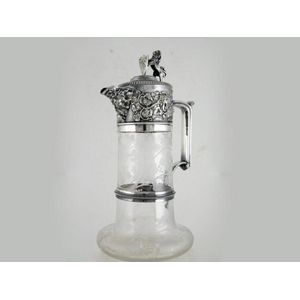
Elkington Plated Bacchanalian Claret Jug
An Elkington plated mounted Claret Jug. Circa 1905. The bombe flat bottomed etched glass base with tubular neck mounted with plated repousse bacchanalian collar, spout, handle and lid surmounted with Lion finial. Stamped to rim 28 cm high
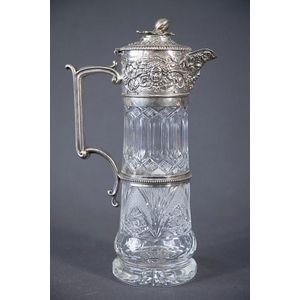
Elkington Silver Plated Crystal Claret Jug with Acorn Finial
Early Elkington silver plated crystal claret jug. Silver plated lid, collar & handle. Acorn finial. Stamped R & Co. Height 29 cm
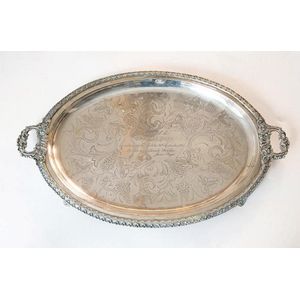
Elkington & Co Silver Plated Banquet Tray with Inscription
Elkington & Co silver plated two handled banquet tray oval shape with cast rim, with floral engraved centre and 1891 presentation inscription to Thomas page, 67 cm width
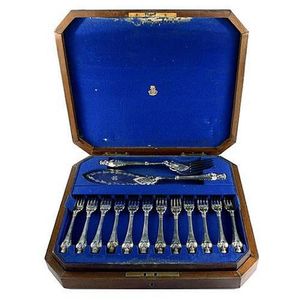
Egyptian Revival Fish Service for 12 in Art Deco Style
A good Art Deco Elkington & Co. silver plated fish service for twelve in the Egyptian revival taste, comprising twelve knives and forks and pair of servers, in a fitted walnut case
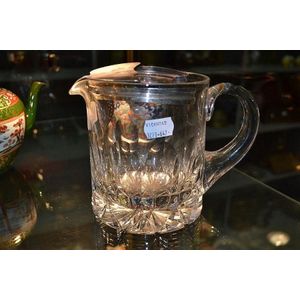
Elkington Plate Jug with Strainer
Large jug with Elkington plate mount with pip strainer, approx 14 cm high
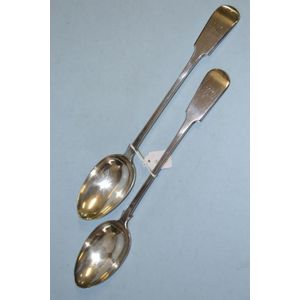
Silver-plated Basting Spoons by Elkington & Co
Pair of quality silver-plated basting spoons - fiddle pattern by Elkington & Co.
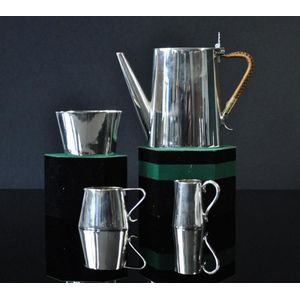
Elkington Plated Ware Set
Four various pieces Elkington plated Ware. Two small milk jugs, sugar bowl & tea pot. Provenance: Private Collection, ACT. Height 13 cm (teapot)
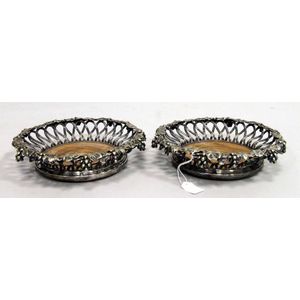
Victorian Elkington Plate Decanter Coasters with Grape Border
A fine pair of mid Victorian Elkington plate decanter coasters with open basket weave pattern and relief grape & vine leaf border, circa 1860.
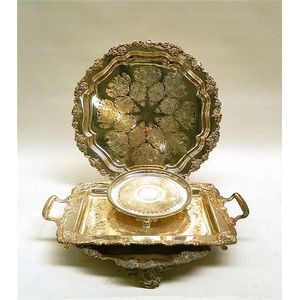
Set of 4 Silver Plate Trays
Four silver plate trays, including Elkington & Co. card tray, Viners oblong tray, Hecworth and one other largest 42 cm width
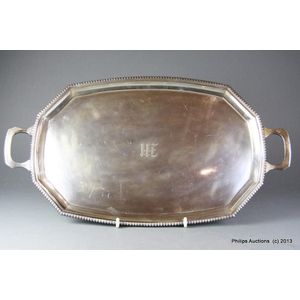
Elkington Silver Plated Oval Tray with Monogram
An Elkington silver plated tray, circa 1911, the oval faceted tray with a shaped and gadrooned rim and simple squared bracket handles, with an engraved monogram to centre; stamped underside. Length 50 cm. Width 30 cm
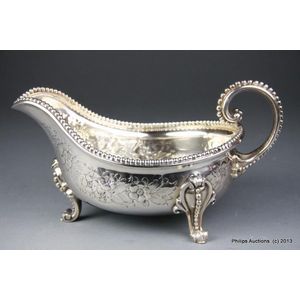
Elkington Silver Plated Sauce Boat, 1851
A fine Elkington silver plated sauce boat, 1851, with original silver plating and of delightful proportions with silver beading to the rim and a similarly embellished scrolled handle, embossed to the bowl with flora and raised on three finely crafted…
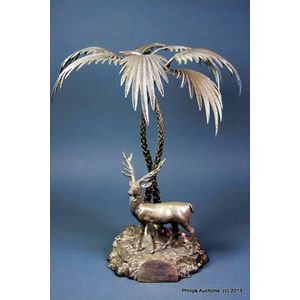
Elkington Silver Plate Stag Centrepiece, 1878
An Elkington silver plate table centrepiece, 1878, featuring a naturalistically cast stag beneath overarching and finely worked tree ferns and upon a rock and vegetated base with a plain plaque to the front; hallmarked to base. Height 44 cm
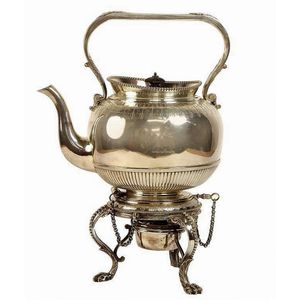
Elkington Silver Plated Kettle with Crest and Stand
Elkington & Co silver plated kettle on stand etched with crest, on claw feet. Height 35 cm

Victorian Grape Vine Table Centrepiece
A Victorian silver plated table centrepiece attributed to Elkington & Co mid to late 19th century, having a central intertwining grape vine column decorated with small bunches of grapes and leaves, supporting 6 branch upper, with 3 candle sconces…
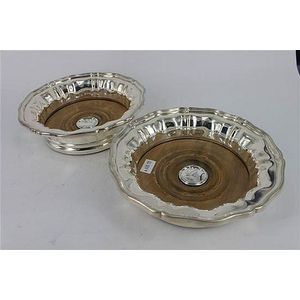
19th Century Elkington Silver-Plate Wine Coasters
A pair of 19th century Elkington silver-plate wine coasters each with engraved boss, crest and motto 'Ne Obliviscaris' ('Forget Me Not'). Diameter 17 cm
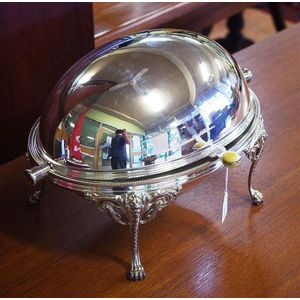
Antique Silver Plated Breakfast Dish with Revolving Dome Top
Elkington antique silver plated breakfast dish oval shaped with revolving dome top and ivory handle, 32 cm wide
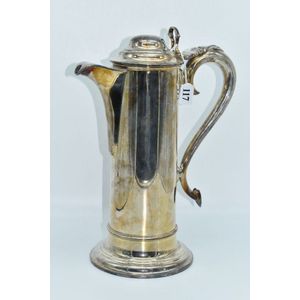


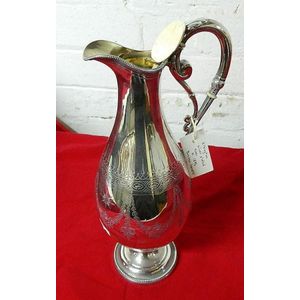

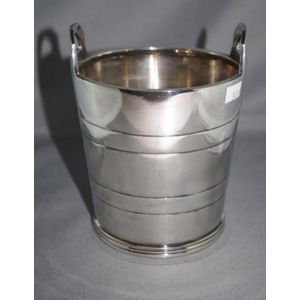
 Loading more...
Loading more...